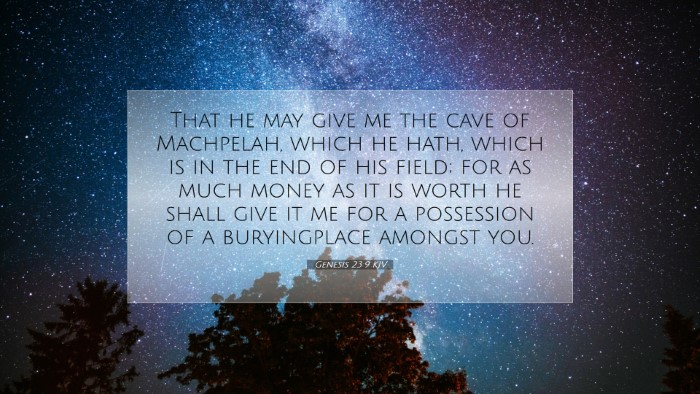Commentary on Genesis 23:9
Genesis 23:9 states: "That he may give me the cave of Machpelah, which is in the end of his field; for as much money as it is worth he shall give it me, for a possession of a burying-place amongst you."
Contextual Background
This verse is situated in a pivotal moment in the life of Abraham, as he navigates through the implications of mortality and legacy. The death of Sarah precipitates the need for a burial site, marking a significant transition in Abraham's journey as a sojourner in Canaan.
The Significance of the Location
The cave of Machpelah, which Abraham requests, holds immense historical and spiritual significance. The land of Canaan is promised to Abraham and his descendants, thus the acquisition of this cave serves as an initial claim to the land, foreshadowing the eventual inheritance.
Matthew Henry's Insights
Matthew Henry emphasizes the importance of the cave of Machpelah as a symbol of Abraham's faith in God's promises. Henry suggests that Abraham, aware of his temporary residence as a foreigner, is pragmatically setting forth his desire for a place of burial where his family can be honored. This act demonstrates his confidence in God's promise of the land to his descendants.
Albert Barnes' Commentary
Barnes highlights the idea of purchase and ownership in this transaction. Abraham insists on paying for the land, which signifies his respect towards the Hittites and indicates a desire for legitimate ownership rather than a mere gift. This echoes the biblical principle that true possession comes through rightful means.
Adam Clarke's Analysis
Clarke adds layers of understanding regarding the cultural practices of the time, noting that land transactions in the ancient Near East were often complex and filled with nuances. He points out that Abraham's request is made publicly and with an established price, ensuring that there is clarity in the inheritance rights which would inevitably follow.
Theological Implications
The act of purchasing a burial site mirrors deeper theological themes. It signifies the intersection of the sacred and the secular; while the land is a burial place, it is also a promise of something greater—the hope of resurrection and eternal life. Abraham's faith is publicly demonstrated, as he stakes his claim in a land that God has promised to him and his offspring.
Faith in Action
- Recognition of Mortality: Abraham’s action acknowledges the eventuality of death and the importance of a dignified resting place.
- Investing in God's Promise: Purchasing the cave represents a tangible investment in God's covenantal promise.
- Public Witness: This act serves as a public testimony to his faith and relationship with God, influencing those around him.
Application for Today
This narrative continues to be relevant for contemporary believers. It reminds us of the significance of faith in the midst of life's uncertainties. Much like Abraham, believers are called to navigate life’s challenges with a steadfast understanding of God’s promises.
- Living as Pilgrims: Just as Abraham was a sojourner, Christians are continually reminded that this life is temporary. Our sense of belonging is in heaven, awaiting the ultimate promise fulfilled in Christ.
- Honoring the Departed: There exists a responsibility to honor the memory and legacy of those who have gone before us, ensuring their stories and faith experiences are not forgotten.
- Faith in Action: Believers are encouraged to act upon their faith by investing in the Kingdom work, displaying transparency and integrity, just as Abraham did.
Conclusion
Genesis 23:9 invites pastors, students, theologians, and Bible scholars to explore profound themes of faith, legacy, and divine promise. The commentary provided by Matthew Henry, Albert Barnes, and Adam Clarke enriches our understanding and reveals layers of significance in what may initially appear to be a simple transaction. As we study these verses, we glimpse a deeper narrative of faithfulness that transcends generations, ultimately pointing to the hope found in Christ.


